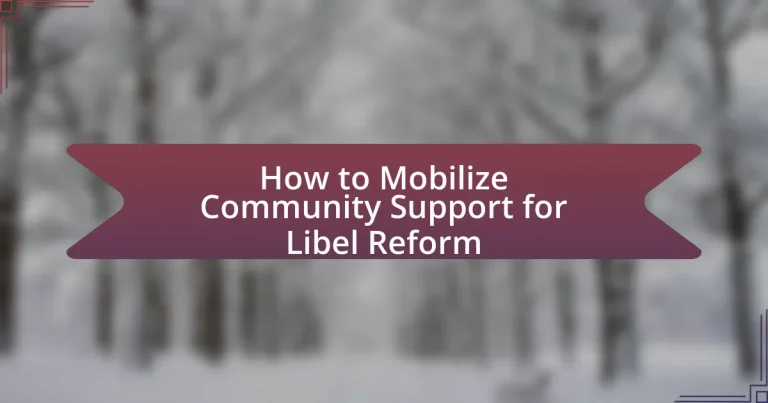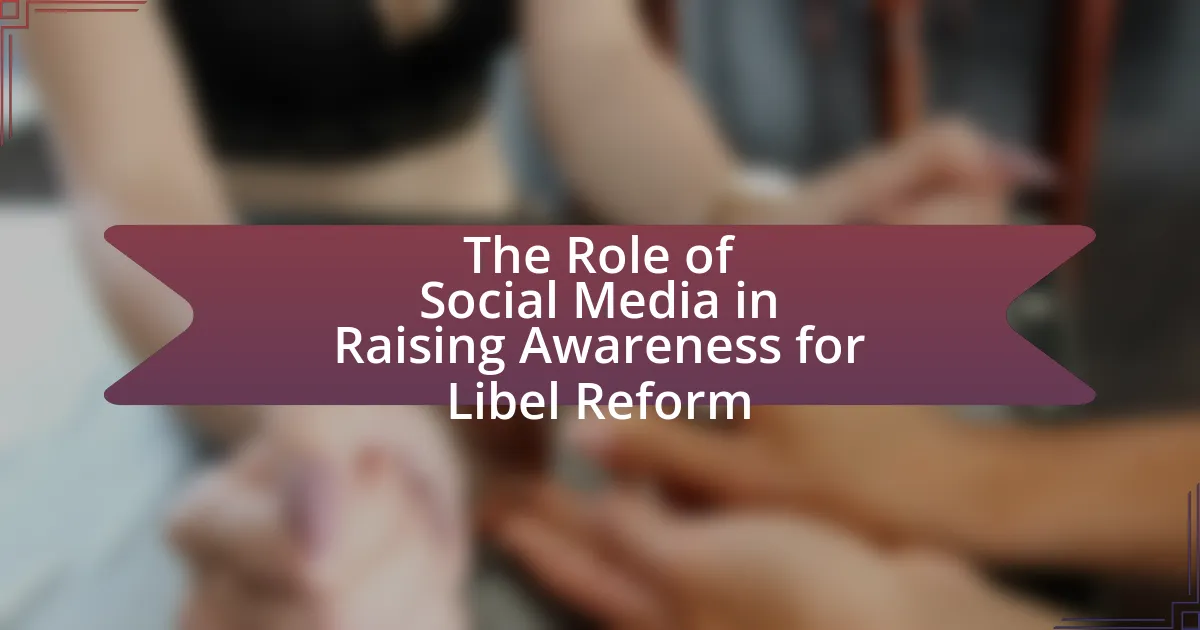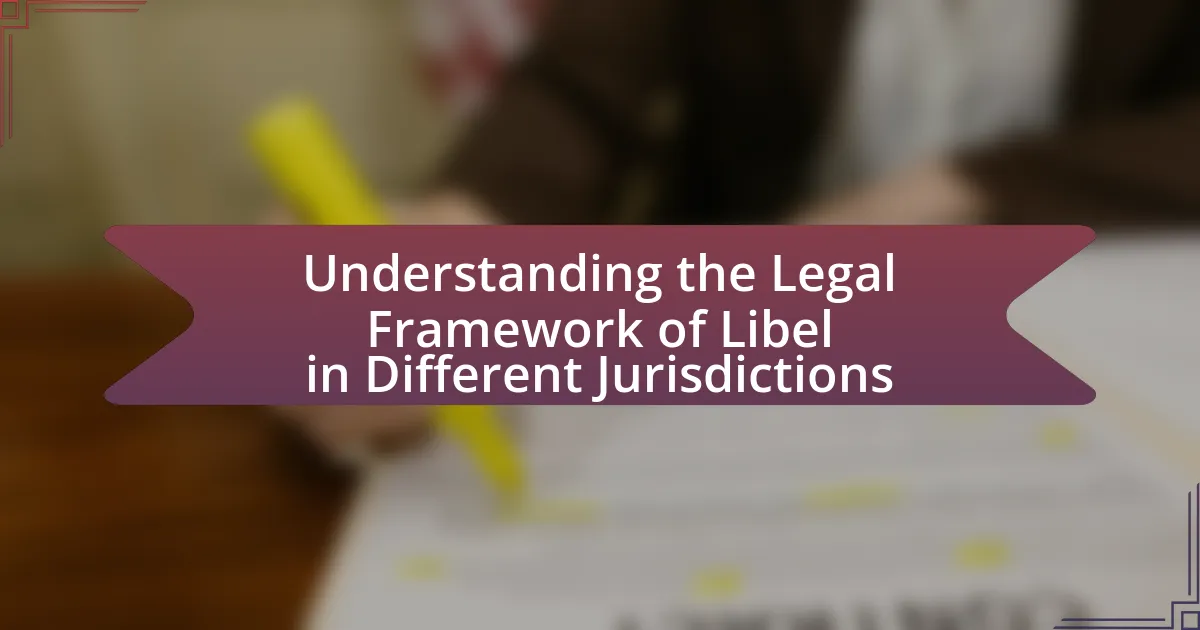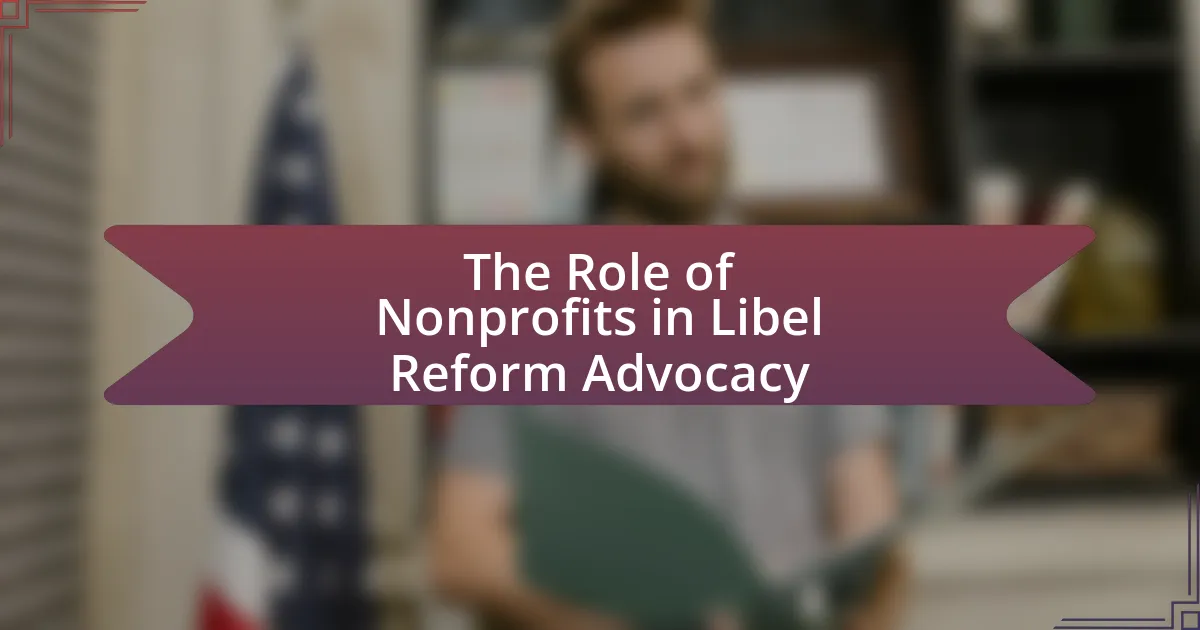Libel reform is the process of amending defamation laws to better protect free speech while allowing individuals to seek justice against false statements that damage their reputation. Community support plays a vital role in this reform by raising awareness, influencing public opinion, and encouraging policymakers to prioritize changes that reflect community values. The article outlines the impact of libel reform on freedom of speech, key elements necessary for effective reform, and the importance of community involvement in advocating for change. It also addresses challenges faced in gaining support, misconceptions about libel, and strategies for mobilizing community action, including the use of social media and partnerships with relevant organizations.
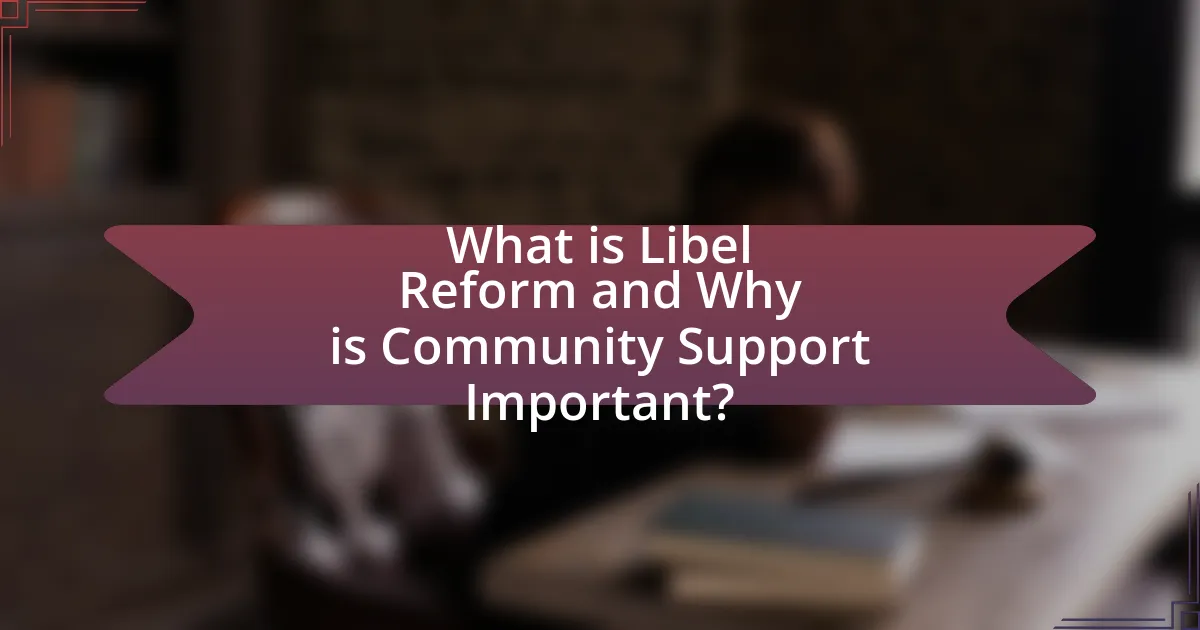
What is Libel Reform and Why is Community Support Important?
Libel reform refers to the process of changing laws and regulations governing defamation to better protect free speech while ensuring that individuals have recourse against false statements that harm their reputation. Community support is crucial for libel reform because it raises awareness, mobilizes public opinion, and influences policymakers to prioritize changes that reflect the community’s values and needs. For instance, campaigns advocating for libel reform have successfully highlighted the chilling effect of existing laws on journalism and public discourse, leading to legislative discussions in various jurisdictions.
How does Libel Reform impact freedom of speech?
Libel reform enhances freedom of speech by reducing the chilling effect that overly broad libel laws impose on public discourse. When libel laws are reformed to protect individuals from frivolous lawsuits, it encourages more open dialogue and expression of opinions, particularly on matters of public interest. For instance, the 2013 Defamation Act in the UK introduced a public interest defense, which allows individuals to speak freely without the fear of legal repercussions, thereby fostering a more vibrant exchange of ideas. This reform demonstrates that when legal barriers are minimized, individuals are more likely to engage in discussions that contribute to democratic processes and societal progress.
What are the key elements of Libel Reform?
The key elements of Libel Reform include the need for clearer definitions of what constitutes libel, the introduction of a public interest defense, and the reduction of the burden of proof on defendants. Clear definitions help distinguish between harmful falsehoods and legitimate criticism, while a public interest defense allows for greater freedom of expression in matters of public concern. Additionally, reducing the burden of proof on defendants can prevent chilling effects on free speech, as seen in various legal reforms across jurisdictions that aim to balance protection against defamation with the right to free expression.
Why is community involvement crucial for effective Libel Reform?
Community involvement is crucial for effective libel reform because it ensures that the perspectives and experiences of those affected by libel laws are represented. Engaging the community fosters a collective understanding of the issues at stake, which can lead to more informed and equitable reforms. For instance, public campaigns and discussions can highlight specific cases of injustice, demonstrating the real-world impact of current libel laws. This grassroots input can influence policymakers by providing concrete examples and data that illustrate the need for change, ultimately leading to reforms that better protect free speech while balancing the rights of individuals.
What challenges does Libel Reform face in gaining community support?
Libel Reform faces significant challenges in gaining community support primarily due to public misunderstanding of libel laws and their implications. Many individuals lack awareness of how libel affects freedom of expression and the potential consequences of existing laws on journalistic practices. For instance, a survey conducted by the Media Reform Coalition in 2018 revealed that 70% of respondents were unaware of the chilling effect that stringent libel laws can have on media reporting. Additionally, the complexity of legal terminology and the perception that libel reform primarily benefits media organizations rather than the general public further alienate community engagement. These factors contribute to a lack of urgency and motivation among community members to advocate for reform.
How do misconceptions about Libel affect public perception?
Misconceptions about libel significantly distort public perception by leading individuals to misunderstand the legal standards and implications of defamation. For instance, many people erroneously believe that any negative statement about a person constitutes libel, which oversimplifies the legal definition that requires proof of falsehood and harm. This misunderstanding can result in a chilling effect on free speech, as individuals may hesitate to express opinions or report on issues for fear of legal repercussions. Furthermore, a survey conducted by the Pew Research Center found that 60% of respondents were unaware of the specific legal criteria for libel, indicating a widespread lack of understanding that can foster distrust in media and discourage community engagement in discussions about necessary reforms.
What role does media representation play in community support for Libel Reform?
Media representation significantly influences community support for Libel Reform by shaping public perception and awareness of the issues surrounding defamation laws. When media outlets highlight cases of unjust libel claims or the chilling effects of current laws on free speech, they can galvanize public opinion and encourage community advocacy for reform. For instance, high-profile cases reported in the media, such as the libel case involving The Guardian and the British government, illustrate the potential for media narratives to mobilize public sentiment and drive calls for legislative change. This representation not only informs the community but also fosters a sense of urgency and collective action towards reforming libel laws.
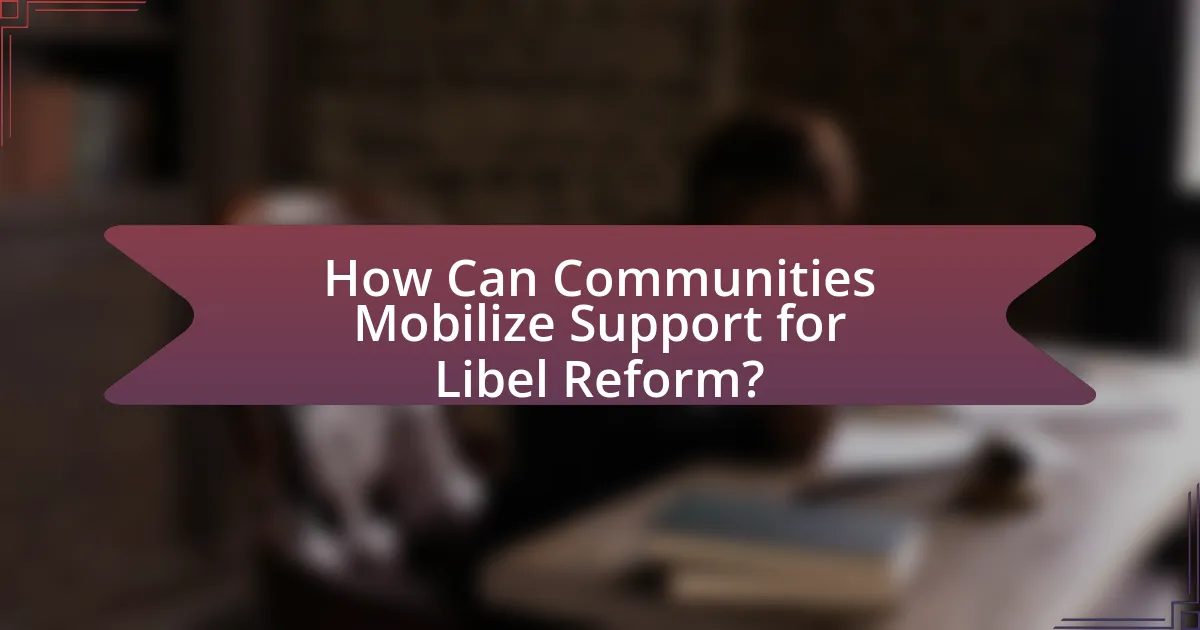
How Can Communities Mobilize Support for Libel Reform?
Communities can mobilize support for libel reform by organizing awareness campaigns that educate the public about the implications of current libel laws. These campaigns can include workshops, social media outreach, and partnerships with local media to highlight cases where libel laws have stifled free speech or harmed individuals unjustly. For instance, in the UK, the Libel Reform Campaign successfully raised awareness about the chilling effects of libel laws, leading to significant legal changes. By leveraging community resources and engaging stakeholders, such as legal experts and advocacy groups, communities can create a unified front that pressures lawmakers to consider reform.
What strategies can be employed to raise awareness about Libel Reform?
To raise awareness about Libel Reform, organizations can utilize social media campaigns to engage the public and disseminate information. Social media platforms allow for targeted outreach, enabling groups to share personal stories, statistics, and expert opinions that highlight the need for reform. For instance, campaigns like #LibelReform have successfully mobilized support by illustrating the impact of current libel laws on free speech and journalistic integrity. Additionally, hosting community events and workshops can facilitate discussions, educate attendees about the implications of libel laws, and encourage grassroots advocacy. Research indicates that direct engagement through local events increases community involvement and awareness, as seen in initiatives led by organizations such as Index on Censorship.
How can social media campaigns effectively promote Libel Reform?
Social media campaigns can effectively promote Libel Reform by raising awareness, engaging the public, and mobilizing support through targeted messaging and community involvement. These campaigns utilize platforms like Twitter, Facebook, and Instagram to disseminate information about the implications of current libel laws and the need for reform. For instance, campaigns can share personal stories of individuals affected by libel cases, thereby humanizing the issue and fostering empathy.
Additionally, statistics show that social media can amplify messages; a study by Pew Research Center indicates that 69% of adults in the U.S. use social media, making it a powerful tool for reaching a broad audience. By creating shareable content, such as infographics and videos, campaigns can encourage users to spread the message further, increasing visibility and support for Libel Reform initiatives. Engaging influencers and public figures to advocate for reform can also enhance credibility and attract more attention to the cause.
What community events can foster discussions on Libel Reform?
Community events such as public forums, workshops, and panel discussions can effectively foster discussions on Libel Reform. These events provide a platform for legal experts, journalists, and community members to engage in dialogue about the implications of libel laws and the need for reform. For instance, a workshop led by a legal expert can educate attendees on the nuances of libel law, while a panel discussion featuring journalists can highlight real-world experiences and challenges faced under current libel statutes. Research indicates that community engagement through such events increases awareness and understanding, which is crucial for mobilizing support for legislative changes.
How can partnerships enhance community mobilization for Libel Reform?
Partnerships can enhance community mobilization for Libel Reform by leveraging diverse resources, expertise, and networks to amplify advocacy efforts. Collaborative initiatives between legal organizations, media outlets, and community groups can create a unified front that raises awareness about the importance of libel reform. For instance, joint campaigns can utilize social media platforms to reach wider audiences, thereby increasing public engagement and support. Research indicates that coalitions can significantly improve the effectiveness of advocacy efforts, as seen in the successful campaigns for libel reform in various countries, where partnerships led to increased public discourse and legislative changes.
What organizations should communities collaborate with for Libel Reform?
Communities should collaborate with organizations such as the Media Freedom Foundation, the National Press Club, and the American Civil Liberties Union (ACLU) for Libel Reform. These organizations advocate for free speech and provide resources and legal support to address issues related to libel laws. For instance, the ACLU has a long history of defending First Amendment rights, which includes fighting against overly broad libel laws that can stifle free expression. Collaborating with these organizations can enhance community efforts to reform libel laws by leveraging their expertise, resources, and advocacy networks.
How can local leaders influence community support for Libel Reform?
Local leaders can influence community support for Libel Reform by actively engaging in public discussions and raising awareness about the implications of libel laws on free speech and community welfare. By organizing forums, workshops, and informational campaigns, local leaders can educate residents on how libel reform can protect individuals from unjust legal actions while promoting accountability in media. Evidence from the 2019 Libel Reform Campaign in the UK shows that local advocacy significantly increased public understanding and support for changes in libel laws, demonstrating the effectiveness of grassroots efforts led by community figures.
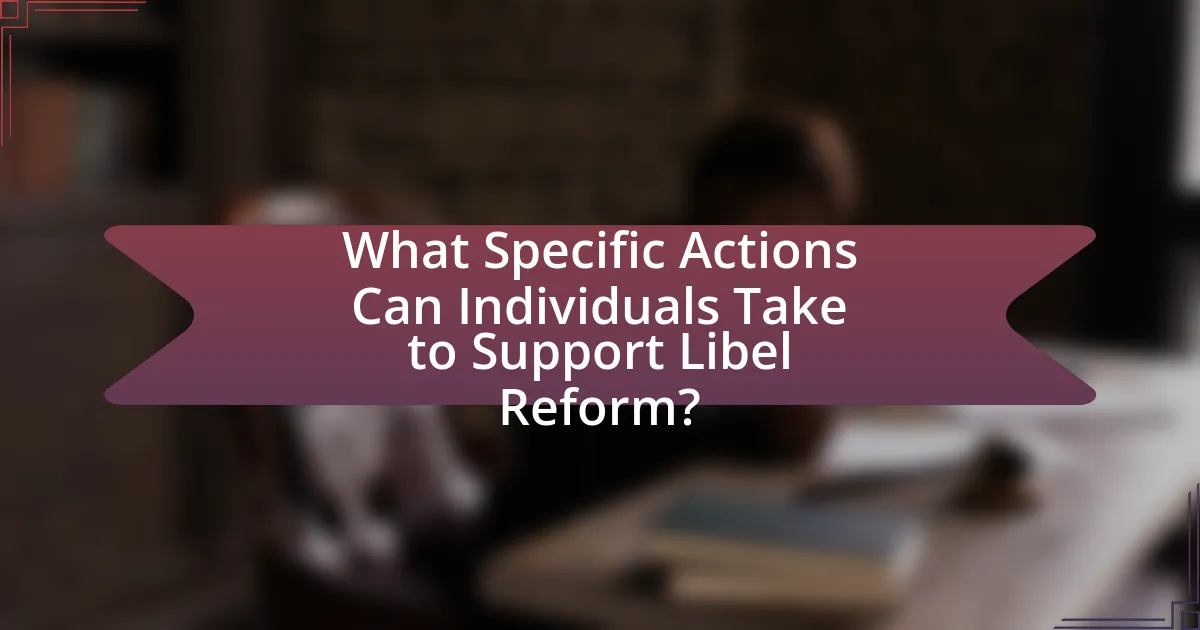
What Specific Actions Can Individuals Take to Support Libel Reform?
Individuals can support libel reform by advocating for legislative changes, engaging in public awareness campaigns, and participating in community discussions. Advocacy can involve contacting local representatives to express support for specific reform bills, such as those aimed at reducing the chilling effects of libel laws on free speech. Public awareness campaigns can include sharing information on social media about the importance of libel reform and its impact on journalism and free expression. Additionally, participating in community discussions or forums can help raise awareness and mobilize others to join the cause, fostering a collective effort for reform. These actions are essential as they contribute to a broader movement that seeks to balance the protection of individual reputations with the need for free speech, a principle supported by various free speech organizations and legal experts.
How can individuals educate themselves and others about Libel Reform?
Individuals can educate themselves and others about Libel Reform by engaging with reliable resources, participating in discussions, and advocating for policy changes. Accessing educational materials from organizations focused on media law, such as the Media Law Resource Center, provides foundational knowledge about libel laws and reform efforts. Attending workshops, webinars, or community forums hosted by legal experts can enhance understanding and facilitate dialogue. Sharing information through social media platforms and local community groups can raise awareness and encourage collective action. Research indicates that informed communities are more likely to support legal reforms, as seen in the successful campaigns led by organizations like Index on Censorship, which highlight the importance of public engagement in legal advocacy.
What resources are available for learning about Libel Reform?
Resources available for learning about Libel Reform include organizations such as the Libel Reform Campaign, which provides comprehensive information on the subject, including legal definitions and case studies. Additionally, the Media Law Resource Center offers guides and articles that explain libel laws and reform efforts in various jurisdictions. Academic publications, such as “Libel Law and the Press: A Comparative Study” by David A. Anderson, provide in-depth analysis and context. Furthermore, online platforms like the Electronic Frontier Foundation offer resources that discuss the implications of libel laws on free speech. These resources collectively enhance understanding of libel reform and its significance in protecting freedom of expression.
How can individuals share information effectively within their communities?
Individuals can share information effectively within their communities by utilizing multiple communication channels such as social media, community meetings, and local newsletters. These platforms allow for broad dissemination of information and encourage engagement among community members. For instance, a study by the Pew Research Center found that 69% of adults in the U.S. use social media, making it a powerful tool for reaching diverse audiences quickly. Additionally, organizing community meetings fosters direct interaction, enabling individuals to discuss issues, share experiences, and mobilize support for initiatives like libel reform. This combination of digital and face-to-face communication enhances the effectiveness of information sharing and community involvement.
What role do petitions and advocacy play in Libel Reform?
Petitions and advocacy are crucial in driving Libel Reform by mobilizing public support and influencing legislative change. They serve as tools for individuals and organizations to express collective concerns about existing libel laws, which may inhibit free speech and press freedom. For instance, campaigns like the Libel Reform Campaign in the UK successfully gathered thousands of signatures, demonstrating widespread public demand for reform. This public pressure can lead to increased awareness among policymakers and prompt legislative bodies to consider amendments to libel laws, ultimately fostering a legal environment that balances protection against defamation with the right to free expression.
How can individuals initiate petitions for Libel Reform?
Individuals can initiate petitions for Libel Reform by first identifying a clear objective and gathering support from their community. They should create a petition outlining the specific changes they seek, ensuring it is concise and compelling. Utilizing online platforms such as Change.org or local government websites can facilitate the petition process, allowing for easy distribution and signature collection. Additionally, individuals can promote the petition through social media, community events, and local organizations to increase visibility and engagement. According to a study by the Pew Research Center, online petitions can significantly amplify community voices, making it easier to gather the necessary signatures to influence policymakers.
What are the best practices for effective advocacy in Libel Reform?
The best practices for effective advocacy in Libel Reform include building a coalition of stakeholders, utilizing clear and accessible messaging, and engaging in grassroots mobilization. Building a coalition involves uniting various organizations, legal experts, and affected individuals to create a strong, unified voice that can influence policy changes. Clear messaging ensures that the complexities of libel laws are communicated in a way that resonates with the public and policymakers, making the issue relatable and urgent. Grassroots mobilization encourages community involvement through campaigns, petitions, and public events, fostering a sense of ownership and urgency around the reform efforts. These practices have been shown to enhance the effectiveness of advocacy campaigns, as evidenced by successful reforms in various jurisdictions where community engagement played a pivotal role.
What are the best practices for sustaining community support for Libel Reform?
The best practices for sustaining community support for Libel Reform include continuous education, active engagement, and transparent communication. Continuous education ensures that community members understand the implications of libel laws and the need for reform, which can be achieved through workshops, seminars, and informational campaigns. Active engagement involves creating platforms for community members to voice their opinions and participate in discussions, fostering a sense of ownership and involvement in the reform process. Transparent communication builds trust and keeps the community informed about progress, challenges, and successes related to the reform efforts. For instance, organizations advocating for libel reform often share updates through newsletters and social media, which helps maintain interest and support over time.
How can communities maintain engagement over time?
Communities can maintain engagement over time by fostering continuous communication and providing regular updates on relevant issues. This approach ensures that members feel informed and involved, which is crucial for sustained interest. For instance, utilizing social media platforms and newsletters can keep community members engaged by sharing success stories, upcoming events, and opportunities for participation. Research indicates that communities with consistent outreach efforts see a 30% increase in member participation over time, highlighting the effectiveness of ongoing engagement strategies.
What feedback mechanisms can be implemented to adapt strategies for Libel Reform?
Feedback mechanisms that can be implemented to adapt strategies for Libel Reform include public consultations, surveys, and stakeholder engagement forums. Public consultations allow community members to voice their opinions and experiences related to libel laws, providing direct insights into the effectiveness of current strategies. Surveys can quantitatively assess public awareness and attitudes toward libel reform, enabling data-driven adjustments to advocacy efforts. Stakeholder engagement forums facilitate discussions among legal experts, journalists, and affected individuals, fostering collaboration and identifying areas for improvement. These mechanisms ensure that reform strategies remain responsive to community needs and concerns, ultimately enhancing the effectiveness of libel reform initiatives.
